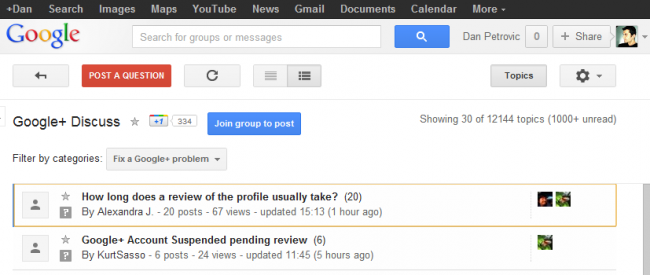
The next stage in Google’s product evolution is undoubtedly unification. Google’s many projects and shatterlings spread over a decade of development in a frantic search for the next big thing are coming back home, empty handed. Now they’re merging into a single universal product, bit by bit every piece of knowledge and experience collected so far is being used and integrated into a bigger, better and faster Google. Everything else will perish.
[blockquote type=”blockquote_quotes” align=”left”]This is the path we’re headed down – a single unified, ‘beautiful’ product across everything. If you don’t get that, then you should probably work somewhere else. Larry Page, Google[/blockquote]This bold statement was directed at Google employees during a staff event following the Search Plus Your World launch. It’s a clear evidence that the information giant is not kidding and are raising the bar for themselves, and their competition.
In 2012 we are to see more product and service canonicalisation at Google. Old and tired projects will be chopped up to bits and the best parts will be integrated into something new, similar products will be merged together and Google’s social network will continue to grow and further integrate with everything else.
***
[blockquote type=”blockquote_line” align=”right”]Google isn’t going to wait for a product to be fully baked before releasing because if they did it would stifle innovation (thats why it’s the Google+ project not product)[/blockquote]
Is this the end of Google’s innovation?
Certainly not. In fact it has been mentioned many times so far that Google’s new policy towards product development is to more or less send it “out there” and field test by collecting data and user feedback in order to rapidly improve result quality, UX and functionality. We’re already seeing examples of this attitude toward product launch in a rapidly evolving Google+ platform and Google Webmaster Forum re-design.
What does Google ‘own’ so far?
Here are a few key things:
- Search: images, videos, academic, news, mobile, books, shopping…etc
- Local: Maps, reviews, business listings
- Email: Gmail, chat, video/audio
- Tools: Translations, directions, conversions, insights
- Office: Google docs, storage, calendar
- Enterprise Solutions
- Social Network: Google+
- Projects & Acquisitions: YouTube, Blogger…etc
- Browser Market: Chrome
- Operating System: Android
- Hardware
- IP: Research, patents, methodologies, algorithms
- Philanthropy, charity, PR, non profit, science and education relations
All these projects and products require different teams in different countries and coordination of activities takes up a lot of time and energy. And of course there’s money. Many take Google for granted and forget they are a business.
Last Year’s Announcements
[blockquote type=”blockquote_line” align=”right”]In 6 months Google+ is going to look like a different product as it integrates with other Google products.[/blockquote]Google made many hints and promises of new and exciting things to come and many have already been released. To illustrate I quote Carter Gibson‘s notes from CrushIQ in November 2011.
Early signs of this announcement were visible already in December 2011 with January and February 2012 rolling out some major changes including the release of Search Plus Your World (also known as SPYW, or simply Search Plus).
Google’s New and Unified Privacy Policy
“One policy, one Google experience”
http://www.google.com/policies/
On March 1, 2012 Google released a privacy policy that is not new, but actually consolidates all the policies from across different Google-owned platforms like YouTube, Gmail, Google+. The intention of unifying their policies was to make sharing information across Google with other users much easier and error-free. All information that is collected and stored by the company is held on secure servers and limits access to only employees with proper authorisation.

Google collects information from users in various ways. This includes information provided when signing up for services, information gathered from the use of services including device, location, log information. The personal data collected is used to create a more personalised and consistent experience for users. This information is shared with a variety of users for different reasons including legal issues and companies that a user consents to sharing with. Google will also aggregate some of the personal data into non-personally identifiable groups and use for other reasons.
Users of Google services have the option and ability to edit personal data that is collected and limit the ways the data is used. Each user is also able to edit any profile information that is publicly shared and control how particular people or groups of people view one’s profile.
Google Play
[blockquote type=”blockquote_line” align=”right”] Now your favorite music, books, movies, apps, and games are all in one place that’s accessible from the Web and any Android device. Discover, buy and share like never before. play.google.com[/blockquote]
The month of March has seen Google usher in a unified privacy policy for the majority of its products. The consolidation continued last week as Google introduced its new Google Play brand. Google Play is a new one-stop destination for users to get content. To be clear, Google Play is essentially just a re-branding, although it does present some new features. With the launch of Google Play, Google has done away with a few separate services. Gone are Google Music, Google Books, and the Android Market. Instead, all of the content that used to be provided under these different brands is now available under the Google Play label. Users can now log on and choose from more than 450,000 apps for Android devices, as well as thousands of movies and millions of songs and books.

The main point of introducing a new service was to simplify things, and Play certainly does make things a lot easier for regular users of Google products. Prior to the new central service, Google Books users couldn’t access their movies from the same place, and users of the Google Music app had to go to the Android Market to purchase songs. Everything has become a lot more intuitive under the new label.
Cloud services are a large part of Google Play’s benefits. Users can purchase a book from Google Play and read it online or on an Android device. Music and movies purchased on an Android device, computer or Google TV unit can be listened to or watched on any other device. All a person needs to do is log in with his or her Google account. Everything is connected together.
Perhaps most appealing of all, the entire new service is free. There’s no need to pay for cloud accessibility. That means users of devices with limited storage don’t have to worry about backing up music they’ve bought should they need to delete it to make room for new content. Google Play users can even add upload up to 20,000 songs from their personal library and access it from any Android device or web browser.
Overall, it looks like a smart move by Google so far. Users have more options and less hoops to jump through to find the content that they want. Free previews of movies and books are also available to help make the purchasing decision. With so much functionality packed into one place, the Apple’s iTunes ecosystem looks to have a legitimate competitor in Google Play.
Leaner and More Focused Google
[blockquote type=”blockquote_line” align=”right”]Resolutions can be hard, and changing products that people love is hard too. But we’re excited to focus on creating a beautifully simple, intuitive user experience across Google – an experience that will change the lives of millions of people. Dave Girouard, Google[/blockquote]The world’s best known search engine has been criticised by many for spreading too far and too thin while attempting to challenge new markets.
Although this is partially true, we must factor in the recent product trim announced by Google. As part of their new year resolution for 2012 Google announced that they will be looking at products which have elements same or similar to other products, those who have not lived up to their potential or simply cannot be integrated with other products and features within Google.
They explain that this move is in order to gain more focus and time for main products and make them work well. Not a bad idea.
Here are a few products which are now officially phased out:
- Google Message Continuity (GMC)
- Google Sky Map
- Needlebase
- Picnik
- Social Graph API
- Urchin
Support, Help & Communication
Webmaster Tools
In 2012 Google’s communication with webmasters and website owners is at an all time high, and not as a sudden surge, but a rather well-planned and gradually executed mission. In 2011 webmasters have seen more security alerts and a new variety of messages for troubled pages and domains. This year brings new addition to an ever growing range of emails being sent out by Google.
Here are some alert examples:
Webmaster Help Forums
In addition to Google Webmaster Tools, Google encourages discussion on their Webmaster Help Forums, which have among many other sections, undergone a total design and functionality re-vamp. The forums currently feel slightly out of place with some functionality, but Google assures us they’re on the ball and more improvements are coming.

Google+ Hangouts
Google also actively used Hangouts to communicate with small groups of webmasters (up to ten at any time) in multiple locations, time zones and languages (English, German Hungarian…etc). We’ve even seen Matt Cutts join in and answer questions in a January hangout.
Public Criticism
SPYW: Social or Creepy?

[blockquote type=”blockquote_line” align=”right”]Google policy is to get right up to the creepy line and not cross it. Eric Schmidt, Google[/blockquote]Google’s prime focus today is the place where link graph meets social graph. Some early reports show that users find personalised search results a little bit too creepy and prefer to have the old results back. How reliable this data is will be revealed through further surveys, but ultimately by user reactions. One way of semi-gauging personalised search adoption would be by monitoring of the (not provided) search referral keyword in Google Analytics.
Non-Inclusive and Proprietary
Many in the search community feel that Google’s attitude change towards third party platforms has changed dramatically – and in the wrong way. Google has been systematically avoiding any integration of third party social media platforms and their functionality in any of its new product releases.
We asked them about this and the answer we received was basically that Google does not feel comfortable investing time and money in building up products and infrastructure to support platforms which may change or turn off access for Google any time they want. We were also reminded of the recent Twitter integration fiasco and the loss of firehose access.

In one way this makes perfect business sense. But when you think about it, what has ever stopped Google from accessing information from different blogging platforms, forums, chats, office documents and other exotic data? Only robots.txt and similar protocols.
In a recent interview with TechCrunch, Vic Gundotra (Google) makes another less than convincing claim on why Google+ won’t let 3rd-party apps post and among other things mentions that “Your Stream Could Easily Be Overwhelmed”.
One other example of this behaviour is lack of support for Vimeo video embedding on Google+ stream. Are we expecting Vimeo to suddenly change their embed code and break everything on Google+? Certainly not. Facebook has done it for a while now so it must not be something you would describe as a great technical challenge.
The Future
Sometimes we need a reminder that Google is a business. They grow, change, make mistakes, learn and improve. I run a company myself and know that my business is only as good as my people. I dare to say that the future looks good for both Google and its users and can claim this on the basis of my personal experience and encounters with many great Googlers who work hard at making their search engine better. This includes the Search Quality Team (including Web Spam Team), Webmaster Help Team, Community Managers, Researchers, Product Developers, UX Specialists and many other departments.
Your Thoughts?
What do you think will happen next in the world of Google? Will their direction remain the same or do you see a shift take place in the future? Please leave your comments below or on Google+.
Dan Petrovic, the managing director of DEJAN, is Australia’s best-known name in the field of search engine optimisation. Dan is a web author, innovator and a highly regarded search industry event speaker.
ORCID iD: https://orcid.org/0000-0002-6886-3211

Well,as I see it after reading this article, the next logical step for Google would be to partner up with Dejan SEO
Since I am a Search Forum TC, I can see that it is more of a unifying process going on and I am happy with that. It sucked to have to go to different platforms and have an entirely new set of rules to play with. I do hangouts very often for the Webmaster Tools and I think that there are a few things still missing. They have not brought the places analytical data into webmaster tools or to analytics as of yet. There are flaws to the system and there will be, nothing is ever perfect to the end user. We just learn to work around the issues. Look at Disqus, no way for them to verify who I am with my G+ profile as of yet, this would be a fail. I am glad that Google is taking the steps to advance.
It’s great to see a TC here! I can’t wait to have the places data in GWT – that would be awesome. Overall Google Places has been a pain in the back for us as we can not explain to Google that our address actually exists. I wish the communication with places team was as good as with the search team. Or maybe I just don’t know the right people?
Now that you’re here, let me ask a question. In the new forum design, how do I go and visit all the posts I made and replied to? I know that currently I have to find one of my posts first and then use the little drop down on the side to view more. My own profile doesn’t contain that information.
I look forward to seeing Google Play in action – I guess this is their chance to try and compete against iTunes.
Great article – I like Google’s product consolidation/canonicalisation/canibalisation innitiatives. At the end of the day, having a single log on is better user experience & means the different products can be used seamlessly. If privacy is a real concern then user data collection can be switched off anyway – the hype is bigger than the problem. Google Play should be interesting 🙂
Some additional “Public Criticism” – I noticed this article this week from an ex-Googler regarding changes in Google as a company, mimicking Facebook & the ad-machine they are: http://blogs.msdn.com/b/jw_on_tech/archive/2012/03/13/why-i-left-google.aspx (note that he’s now a Microsoft employee)
I think as long as they stick to their original ethos of “best quality results/experience for the user” then they will continue to deliver.
In the current forums they are still working on a way to mark posts that we have replied to so we can reply to posts that have replied to. The best thing to do is to follow the Google employees in the forums on G+ so that you you can start to communicate with them. There are many GWT’s hangouts that you can join in on. Right now there are no search hangout’s just for GWT’s.
I’m sure Disqus would – like so many other players – welcome an API to allow G+ integration, but somehow I really doubt that will happen this side of any Mayan Apocalypse. If anything Google could buyout Disqus and back door bed in Google Plus commenting into a tonne of engaged websites out there.
SEO is important for the seo. Get a affordable seo services.
The chap above has an IQ of a mollusc.
SEO Service is improving your ranking in the search engine results is absolutely vital to ensure the survival of your company. The problem is that learning how search engines work is a tremendously time consuming task and you may not even be successful in improving your position if you try it yourself.
SEO not only affects the serp’s, but also image look for, video look for and industry specific vertical google. It determines how a look for algorithm functions and searches what is popular with people. When a website link is submitted to a look for website, a spider crawls through a page to gather links which lead to other pages and stores those pages on the server of the look for search engine.